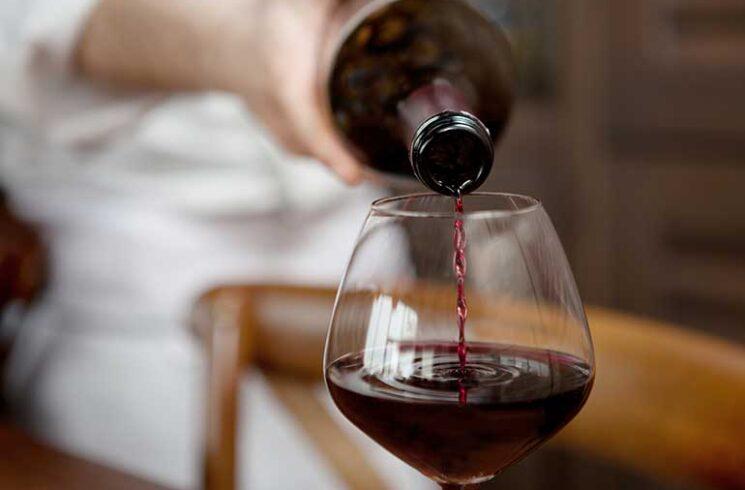Studies point to potential benefits, but don’t open a bottle just to improve your health
Pause for a moment before uncorking a red wine in the name of a healthier heart. The reason? Let’s just say the relationship between merlot and your ticker is more nuanced than anything bottled in Bordeaux.
Now it’s true that some research connects moderate consumption of red wine with improved heart health. These studies would be the source of those eye-catching “red wine is good for you” headlines.
HOWEVER, there’s no clear cause-and-effect link that makes a daily glass of red wine medically recommended. So, don’t expect a prescription for a daily glass of cabernet sauvignon anytime soon.
To make better sense of it all, let’s turn to cardiologist Dennis Bruemmer, MD.
Can red wine benefit your heart?
Let’s talk grapes, those tiny little fruit balls perfectly designed to ferment into an alcoholic drink.
A similar process guides the making of red and white wines from grapes. The reason the wines look so different involves what’s in the fermentation tank. Red wines are typically fermented with grape skins and seeds. In white wine, those parts of the grape are quickly removed.
So, why bring up wine-making detail? Well, grape skins include a polyphenol called resveratrol — which is central to many heart-healthy claims. Red wine offers 10 times the amount of polyphenols than white wine.

Polyphenols and resveratrol are considered antioxidants that provide protection for your body.
“Resveratrol helps activate an enzyme called telomerase, which protects genome integrity,” explains Dr. Bruemmer. “And because of that, this resveratrol has been associated with preventing cardiovascular disease and actually extending longevity.”
But before you rush off to the wine store in hopes of adding birthdays, know this: Much of that evidence involves laboratory or non-human testing. “It has never really been proven in people,” notes Dr. Bruemmer.
There’s also a question of whether red wine delivers enough resveratrol to make a difference.
“The amount of resveratrol one would have to consume to match blood levels shown in studies would be outrageous,” he adds. “It would be impossible to achieve that with red wine.”
Explaining ‘The French paradox’
People in France drink a lot of red wine. By some estimates, the average adult consumes about 47 liters (12.4 gallons) of wine every year. That works out to more than 62 bottles being uncorked and poured.
Another interesting tidbit about France? The country sees lower rates of heart disease than one might expect given the popularity of smoking and foods high in cholesterol and fats. (Cheese, anyone?)
Meshing those two factoids — no doubt over a nice pinot noir — led some to surmise that red wine is very good for your heart. The theory became known as “The French paradox.”
Is it valid? Not likely, surmises Dr. Bruemmer. “I don’t think people believe this any longer,” he says. “There are many more compelling arguments than wine intake to explain lower coronary artery disease mortality rates in France.”
Compared to the United States, for instance, France has:
- Lower rates of obesity and Type 2 diabetes.
- Higher rates of exercise.
- Healthier eating habits due to adherence to the Mediterranean diet, smaller portion sizes and less fast food.
“I believe the French paradox is really not explained by alcohol and red wine consumption as much as these other factors,” states Dr. Bruemmer.
Does alcohol offer health benefits?
Red wine’s claim as a good-for-you elixir gains a boost from studies suggesting that low levels of alcohol consumption may be good for your long-term survival. Moderate alcohol intake has been shown to:
- Increase “good” high-density lipoprotein (HDL) cholesterol to help keep blood flowing unimpeded through your blood vessels. (Learn more about “good” and “bad” cholesterol.)
- Offer anti-inflammatory properties, which can lower your risk of heart disease, stroke and Type 2 diabetes.
- Minimize blood clots by thinning out your blood.
But there’s a fine line between these potential benefits and the damage alcohol can inflict upon your body if quaffed irresponsibly. Drinking too much alcohol increases your risk of:
- Alcohol use disorder.
- Liver disease.
- Some types of cancer, including breast, colorectal, esophageal and liver.
- Heart failure.
“Most people want to hear that alcohol is good for you — and that’s obviously not the case,” says Dr. Bruemmer. “It can have a very toxic effect on your body.”
Defining ‘moderate’ drinking
The federal Dietary Guidelines for Americans, 2020-2025 advises that adults of legal drinking age should limit alcohol intake to two drinks or fewer in a day for men and one drink or less in a day for women.
A standard alcoholic drink is typically defined as:
- 12 ounces of regular beer (5% alcohol).
- 5 ounces of wine (about 12% alcohol).
- 1.5 ounces of a distilled spirit (about 40% alcohol, or 80 proof).
The dietary guidelines shouldn’t be viewed as a reason to add alcohol to your routine either. Want proof? Consider this advice from the National Institutes of Health: “Drinking less is better for health than drinking more.”
So, is red wine heart-healthy?
Is red wine good for your heart? “I would say that is unknown,” admits Dr. Bruemmer. “We don’t really know.”
Some studies do indicate that the secret to a longer life might be found at the bottom of a wine goblet. But there’s nothing that shows without a doubt that red wine (or any alcohol) is ideal for your health.
“As physicians, we would never recommend that someone start drinking alcohol to protect themselves from death,” he continues. “There’s just no evidence to support that.”
And if you sip the occasional glass of red wine or another adult beverage with a few meals a week … well, you should be OK. “If you’re going to enjoy a drink, focus on doing it in moderation,” advises Dr. Bruemmer.
Just don’t think you’re doing it for your health.
Source: Cleveland Clinic



















